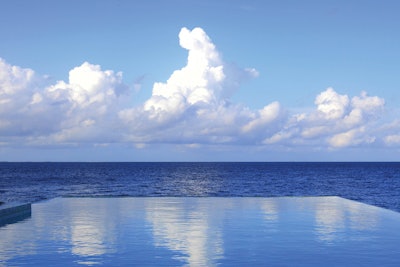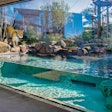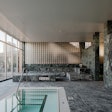
My relationship with recreational water began when I first entered the pool industry at age 18. Prior to that, I had only passing interest in spending time in nature, and was never much of a swimmer. Little did I know that the experience of being near man-made bodies of water would define my entire professional career.
What I have learned from the very start is the pool consumer is driven almost entirely by the experience of owning a pool. As an industry, we may acknowledge that idea, but in reality, I believe we have done little to promote it, at least in any kind of concerted way and especially not so on a national level.
I’ll go so far to say that I believe our success is a byproduct of the insatiable demand for pools, but we are not the cause of that demand. In some ways, we’ve succeeded in spite of ourselves.
BANQUET FOR THE SENSES
When we talk about “experience” as the driving factor, it’s important to truly understand what we mean by that. It’s easy to see that the pool experience is so powerful and hardwired in the human psyche that even our largely misapplied approach to marketing has not quelled that demand.
The experience that our consumers are looking for is all about luxury and gratification of the senses. It’s dining and drinking poolside, spending time with family and friends, and simply enjoying time by the water. But it’s also about pride of ownership.
Yes, to some degree, it is about ego and vanity, and maybe that sounds cynical, but it is just the reality of human nature. This is why so many people will spend hundreds of thousands of dollars on their backyards — they want to signify their accomplishments and feel proud of their homes.
It’s the same exact reason that people drive luxury automobiles and live in custom houses. Very few drivers care about the spark plugs or the catalytic converters in their cars, but most do care about the looks and the smooth ride.
Yet, most of our marketing efforts have been aimed at selling pumps and other pool products to other members within the industry. And while that’s the nature of the business to a large extent, we need to wake up and collectively realize this does absolutely nothing to reach the consumer.
As an industry, we should absolutely be concerned with delivering quality products but, again, that’s not what drives homeowners to sign on the bottom line.
WHAT IT'S NOT
In my view, as an industry, we have a habit of focusing on things that are not the most important to the purchasing decision. I realize that many of you reading this may disagree, but our success is not driven by the desire to actually get in the water, at least not for a large percentage of consumers.
Our focus on the health benefits of swimming is, I believe, to an extent overwrought. Yes, of course, health and wellness drive some people to own a pool, and for those healthful souls, they’ve invested in the best way to advance your health. Yet, that is far from the main factor for most of our customers.
To my mind, it makes little sense to appeal to buyers on the basis of something that is largely unimportant to most of them. Is there a place for people who like to swim? Of course, but I’ve long believed that it’s not going to be something that increases sales, at least not to a large extent.
This is why I have long thought we need to drop the word “swimming” and just call them “pools.” Better yet, we might consider adding more specific descriptive terms to the mix. Perhaps the terms “backyard” pools, or “prestige” pools, or “play” pools, or “social” pools. We already have “wave” pools, “hydrotherapy” pools, “lap” pools, and “resort” pools, why not add a few more pool types to the list of terms we use to describe them.
And, yes, for those pools built specifically for swimming, such as competition pools at high schools and universities, the old term does accurately apply.
LESS RELEVANT CONCERNS
I see other areas where our analytical thinking could be sharpened. For example, there’s a great deal of talk about inflation and labor shortages right now. There is no question that economic factors can make doing business difficult, but there is another way to look at inflation, material and labor issues. Those things do enable us, I believe, to justify increasing prices.
Plus, we know that economics are always cyclical and things like labor and material shortages will soon be a thing of the past. In the meantime, I argue we should use these factors to justify elevating prices, and most importantly, profits.
It’s true the recent pandemic changed the way our economy works in some respects, but when it comes to our industry, it only revealed how invisible the demand is, and again, it’s not at all because people want to improve their health during a viral outbreak.
They want to have an at-home venue for socializing and luxuriating in the glow of their own, hard-earned success. The sooner we focus on the most relevant market driver, the sooner we’ll see our own collective success rise to new heights.
A true legend of the pool industry, Vance Gillette began his career in 1966 as a teenager selling pool cleaners. He served in top positions for different companies over the years, but is known mainly for his work at Jandy (and then Zodiac), from which he retired in 2013.
This article first appeared in the July 2022 issue of AQUA Magazine — the top resource for retailers, builders and service pros in the pool and spa industry. Subscriptions to the print magazine are free to all industry professionals. Click here to subscribe.











































